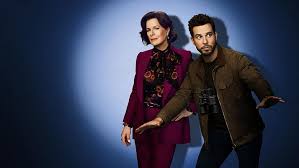
The Anchor in the Gale: Why So Help Me Todd Needs a New Approach With Allison
In the vibrant, often chaotic world of "So Help Me Todd," the Wright family is a beautifully orchestrated symphony of contrasting personalities. Margaret, the formidable lawyer, a whirlwind of ambition and maternal meddling. Todd, the charmingly disheveled private investigator, a magnet for trouble and unexpected brilliance. And then there's Allison – the steadfast elder sister, the voice of reason, the successful surgeon who always seems to be on call. Allison is undeniably the anchor of the Wright family, holding firm against the gales of Todd's latest misadventure and Margaret's sometimes overbearing nature. Yet, for all her stability, Allison often feels less like a fully realized character and more like a beautifully rendered plot device. For "So Help Me Todd" to truly deepen its narrative well, it needs to take a bold, new approach with Allison, allowing her to step out of the shadows of her family's drama and into her own compelling spotlight.
Currently, Allison's role is often one of reaction. She's the exasperated older sibling, the concerned daughter, the busy professional whose personal life seems perpetually secondary to her family's crises. Her storylines are frequently tethered to Todd’s recklessness or Margaret’s career, casting her as the sensible foil rather than an independent agent with her own complex desires, fears, and internal conflicts. We see her roll her eyes, sigh deeply, or offer a pragmatic solution, but rarely do we delve into the rich emotional landscape that must surely exist beneath her polished, capable exterior. She’s the rock, yes, but rocks, too, have hidden fissures, geological histories, and the potential to crumble or reveal sparkling geodes.
A new approach for Allison begins with granting her genuine, independent struggles and triumphs that aren't solely contingent on her family. Imagine Allison, not just reacting to Todd’s latest misadventure, but grappling with a crisis of her own making. Perhaps a quiet discontent simmering beneath her polished exterior, a whisper of "is this all there is?" after years of dedicated service. What if her marriage to Chuck, seemingly stable and supportive, faced an unexpected challenge – not a melodramatic affair, but a profound shift in values or a deep-seated professional jealousy? A storyline that explores the quiet, internal battle of a woman who has dedicated her life to others, only to realize she’s lost touch with her own passions, could be profoundly resonant. This would allow her to express emotions beyond frustration and concern, opening her up to vulnerability, longing, and even joyous rebellion.
Furthermore, her professional life, currently a convenient source of long hours and high stress, could become a vibrant narrative arena. Instead of her surgical career being a convenient excuse for her absence or a source of familial stress, let it become a stage for high-stakes ethical dilemmas, professional rivalries, or even groundbreaking medical challenges. What if a complex ethical dilemma arises in her hospital, forcing her to choose between procedure and patient advocacy, potentially jeopardizing her prestigious position? Or perhaps, inspired by Todd's unconventional methods, she finds herself bending rules to save a patient, leading to a legal or moral quandary that she, not Todd or Margaret, must navigate. This would showcase her brilliance, her compassion, and her moral fortitude in a way that simply being "the doctor" never can.
Finally, the show could dramatically enrich its character dynamics by allowing Allison to break free from her established relationships. Her dynamic with Todd, while often amusing, frequently reduces her to the eye-rolling foil. What if, in an unexpected moment of insight, Todd offers Allison genuine emotional support for a problem entirely unrelated to him, revealing a surprising maturity? Conversely, what if Allison, for once, indulges in a spontaneous, slightly reckless act that forces Todd to be the responsible one? Her relationship with Margaret also holds untapped potential beyond gentle remonstrations; a storyline exploring Margaret's hidden anxieties about Allison's happiness or Allison's own desire for Margaret's approval could unveil layers of their mother-daughter bond. And Chuck, often seen as the placid, supportive husband, could reveal a hidden ambition or struggle that challenges their carefully constructed domesticity, compelling Allison to support him in unexpected ways.
By daring to peel back the layers of the "perfect" Dr. Wright, "So Help Me Todd" could unlock a wealth of narrative possibility. It's time to let Allison make a spectacular, irrational mistake, to fall passionately in love with a new hobby, to face a professional rival who mirrors her ambition, or to simply express a yearning that has nothing to do with solving someone else's problems. Giving Allison her own rich, independent narrative arc wouldn't diminish the show's core family dynamic; it would, in fact, strengthen it, transforming the anchor from a static weight into a dynamic force, capable of weathering any storm with her own unique, compelling story. It's time for Allison to truly live, not just react.
